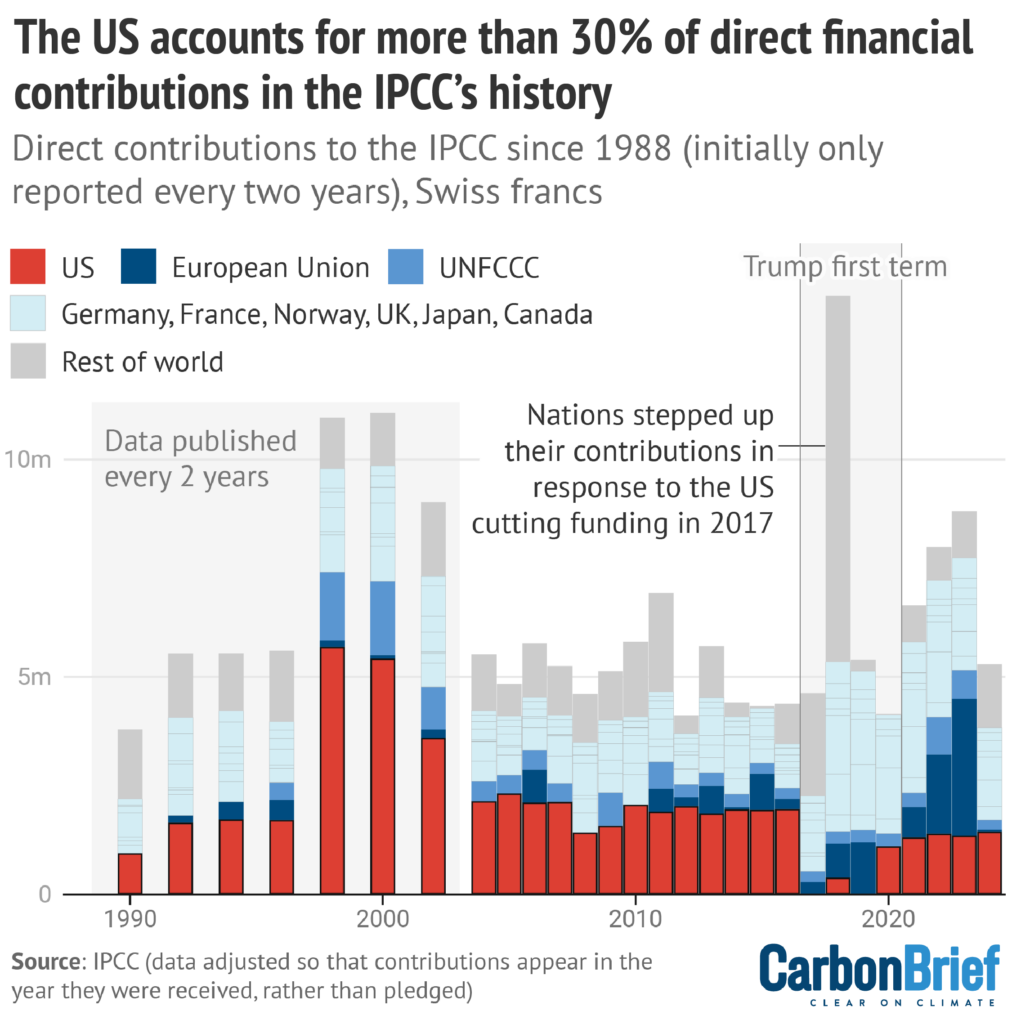Welcome to Carbon Brief’s DeBriefed.
An essential guide to the week’s key developments relating to climate change.
This week
China’s ‘two sessions’
‘CONCRETE MEASURES’: China’s premier Li Qiang said the country will work “diligently” and take a “series of concrete measures” to achieve the country’s “dual-carbon” goals of peaking CO2 emissions before 2030 and achieving carbon neutrality by 2060, state newspaper China Daily reported. Li made the comments as he delivered the “report on the work of the government”, a major policy document that outlines key priorities for 2025, at the nation’s all-important annual “two sessions” meeting, it said.
RENEWABLES PACKAGE: China also announced plans to develop a package of major projects to tackle climate change at the meeting, Reuters reported. A new report from the country’s National Development and Reform Commission outlined plans to develop new offshore wind farms and accelerate the construction of “new energy bases”, it added. However, coal will remain a “key fuel”, with plans to increase production and supply, the article noted.
NEW NEGOTIATOR: Li Gao was promoted to vice minister at China’s Ministry of Ecology and Environment, replacing Zhao Yingmin, who served as the head of China’s delegation to COP29, according to Bloomberg. Li is a “climate negotiator” with “two decades of experience in global climate change talks” and an “advocate of the country’s carbon-credit programme”, the article noted.
Trump continues cuts
CUTTING FORESTS: Trump signed an executive order to expand logging across 280m acres of US national forests and other public lands, the Guardian reported. Conservation groups warned that this could have a “disastrous impact on climate change, endangered species and local economies dependent on ecotourism”, added Inside Climate News.
‘NATIONAL DISASTER’: BBC News reported that around 880 workers at the US National Oceanic and Atmospheric Administration (NOAA) were fired last week. Reuters said that Jane Lubchenco, the former NOAA administrator under Barack Obama, called the layoffs a “national disaster and a colossal waste of money”, adding: “Destroying NOAA’s ability to provide life-saving information, keep our ocean healthy and strengthen the economy makes no sense – no sense at all.”
‘PIVOTAL CENTERS’: The Trump administration told NOAA that “two pivotal centres for weather forecasting will soon have their leases cancelled”, sources told Axios this week. Elsewhere, Reuters reported that the US is pulling out of the Just Energy Transition Partnership, where wealthy countries help support developing countries to move away from coal, according to several participating countries.
Around the world
- INDIAN AVALANCHE: An avalanche in the Himalayan state of Uttarakhand that killed eight people was triggered by a 600% surge in precipitation within 24 hours, fuelling “climate concerns”, reported the Times of India.
- EU EMISSIONS: The European Commission announced that carmakers will have three more years to meet emissions rules, but the 2035 ban on the sale of petrol and diesel cars remains in place, according to the Financial Times. Reuters added the EU is also still committed to its interim target for zero-emission car sales for 2030.
- JAPANESE WILDFIRE: Japan’s biggest wildfire in 30 years has burned around 2,100 hectares and killed one person so far, the South China Morning Post reported.
- CLIMATE MULTILATERALISM: Brazil will use the COP30 climate summit in November to “press for multilateralism and respect for science”, said president-designate Andre Aranha Correa do Lago, according to Reuters.
- NORTH SEA: The UK has confirmed it will not issue new North Sea oil and gas licences and announced a 2030 end date for the “windfall tax”, first introduced when fossil-fuel company profits skyrocketed in 2022, in new plans released ahead of a consultation, the Press Association reported.
36
The number of fossil-fuel companies responsible for half of global CO2 emissions, the Guardian reported.
Latest climate research
- An AI-driven assessment of COP side events from 2003-23 published in Nature Climate Change examined how fossil-fuel lobbyists have been gaining access to UN climate summits to “uncover power dynamics at the highest levels of climate governance”.
- In a high-emissions future, melting Antarctic ice could lead to Earth’s strongest ocean current slowing down by 20% by 2050, according to a new study in Environmental Research Letters.
- Women and girls continue to bear a disproportionate impacts from heatwaves in South Sudan, according to a new World Weather Attribution analysis.
(For more, see Carbon Brief’s in-depth daily summaries of the top climate news stories on Monday, Tuesday, Wednesday, Thursday and Friday.)
Captured

At the Intergovernmental Panel on Climate Change’s (IPCC) meeting in Hangzhou, China, governments failed for a third time to agree to a timeline for the next round of UN climate science reports, according to Climate Home News. The absence of US federal scientists “cast a shadow” over the IPCC meeting, reported the Financial Times. The chart above, from Carbon Brief’s in-depth coverage of the meeting, highlights that the US has provided around 30% of the voluntary contributions to the IPCC’s financial budgets since it was established in 1988.
Spotlight
The ‘Super Grid’ campaign of the 1950s
As the UK looks to expand its grid, Carbon Brief takes a look at what can be learned from the Super Grid expansion 70 years ago.
Electricity demand in the UK is expected to at least double by 2050, requiring an expansion of the grid to keep pace. National Grid has launched the “Great Grid Upgrade“, with at least 17 major infrastructure projects being built as part of this.
However, there has been repeated pushback, with critics condemning plans to “carpet” the countryside with pylons, “devastating” locals and “shattering” rural dreams.
Speaking earlier this year, energy and climate change secretary Ed Miliband said there would need to be a communication campaign to convey the benefits of the expansion, pointing to one during the last big expansion in the 1950s and 60s – known as the “Super Grid”.
Super Grid
The UK’s first electricity transmission grid began operation in 1933 – this excludes Northern Ireland, which is part of Ireland’s power grid. National Grid was created in 1935 and the regional grids were connected into the world’s first integrated national grid in 1938.
By 1950, the grid was at capacity, with demand rising ninefold in just 15 years.
Out of this the idea for a “Super Grid” was born. Made up of 1,150 miles of power lines held by 136-feet-high steel pylons, the grid cost £52m, roughly £1.4bn in today’s prices, over 10 years.
It was designed not just to increase capacity, but also to strengthen the north-to-south interconnections of the existing grid, especially as generation capacity shifted to large coal-fired power stations to the north of London.
After it was announced, opposition around the UK was voiced by local authorities, preservationist groups, voluntary societies and residents, citing concerns about the visual impact of the new pylons on the countryside, as well as concerns around industrialisation and the economy.
Speaking to Carbon Brief, Prof Katrina Navickas at the University of Hertfordshire said that the Super Grid expansions were undertaken during a time when there was a post-war “desire for modernisation, efficiency and growth”, adding:
“These aims were often in tension with popular demands for amenity and countryside preservation, as the national parks were set up from 1949 and a popular idea of preservation of the rural landscape arose out of the right to roam movement.”
Attempts were made to minimise the impact of the pylons on the landscape. For example, the electricity boards argued that the large scale of the infrastructure would fit the landscape better than a “cluster” of smaller grid, noted Navickas.
Debate continued into the 1960s, with ministers questioning the impact of the Super Grid “upon the beauty of the countryside”, calling on army specialists to look at the potential of camouflage and arguing against the pylons being “painted in antinationalisation Tory colours”.
Communication challenges
To try to counter the opposition to the Super Grid and wider grid expansion, the Central Electricity Generating Board (CEGB) launched an information campaign, using articles and adverts to try to convey the benefits of an expanded electricity network.

For example, one advert (above left) highlighted surging electricity demand and the need to ensure supply for future generations.
Others sought to highlight that the CEGB appreciated the need to protect the countryside and expand.
As an advert in Country Life (above right) highlighted, there is a “double duty” that falls on the shoulders of those tasked with managing the grid expansion. This is to “maintain an efficient, economical electricity supply, but also to preserve the amenities of the country”.
Some of the challenges around the attachment to the “amenity value of local landscapes” still exist today, Navickas added:
“But the ecological and environmental considerations are also much more to the fore than they had been in the 1950s and 1960s. Local community consultation has to be at the heart of any planning schemes too, whereas the earlier schemes were implemented in a much more top-down way that assumed that local opposition was based on lack of understanding of national benefits.”
Watch, read, listen
CLIMATE LENS: A new podcast titled Lights, Climate, Action discussed film and TV through a climate lens, with hosts talking about the film Don’t Look Up in their first episode.
ACTIVISM AND TRUMP: Yale360 interviewed activist and author Bill McKibben about “rethinking the role of protest, the global push on clean energy and why he sees reason for hope” in the “age of Trump 2.0”.
WOMEN’S DAY: To mark International Women’s Day, Costa Rican diplomat and former UN climate chief Christiana Figueres is joined by top climate scientist Dr Katharine Hayhoe on her Outrage and Optimism podcast to discuss why ignoring women endangers the climate.
Coming up
- 11 March: Greenland’s general election
- 16-25 March: Climate and Clean Air Conference, Brasilia, Brazil
- 17 March: G20 Second International Financial Architecture Working Group Meeting, Pretoria, South Africa
- 18-19 March: OECD x IEA Global Forum on the Environment and Climate Change, Paris, France
- 18-19 March: Berlin Energy Transition Dialogue, Berlin, Germany
Pick of the jobs
- Union of Concerned Scientists, senior climate scientist | Salary: $134,805. Location: Washington DC/remote
- Intergovernmental Panel on Climate Change, head of communication in the IPCC working group I technical support unit | Salary: Unknown. Location: Paris, France
- Community Energy England, chief operating officer | Salary: £46,000-£52,470. Location: Remote/Sheffield
- Irish Department of the Environment, Climate and Communications, head of circular economy and resource efficiency | Salary: Unknown. Location: Ireland
DeBriefed is edited by Daisy Dunne. Please send any tips or feedback to debriefed@carbonbrief.org.
This is an online version of Carbon Brief’s weekly DeBriefed email newsletter. Subscribe for free here.
The post DeBriefed 7 March 2025: China’s pivotal ‘two sessions’; IPCC indecision; Lessons from UK’s 1950s ‘Super Grid’ appeared first on Carbon Brief.
Climate Change
A Tiny Caribbean Island Sued the Netherlands Over Climate Change, and Won
The case shows that climate change is a fundamental human rights violation—and the victory of Bonaire, a Dutch territory, could open the door for similar lawsuits globally.
From our collaborating partner Living on Earth, public radio’s environmental news magazine, an interview by Paloma Beltran with Greenpeace Netherlands campaigner Eefje de Kroon.
A Tiny Caribbean Island Sued the Netherlands Over Climate Change, and Won
Climate Change
Greenpeace organisations to appeal USD $345 million court judgment in Energy Transfer’s intimidation lawsuit
SYDNEY, Saturday 28 February 2026 — Greenpeace International and Greenpeace organisations in the US announce they will seek a new trial and, if necessary, appeal the decision with the North Dakota Supreme Court following a North Dakota District Court judgment today awarding Energy Transfer (ET) USD $345 million.

ET’s SLAPP suit remains a blatant attempt to silence free speech, erase Indigenous leadership of the Standing Rock movement, and punish solidarity with peaceful resistance to the Dakota Access Pipeline. Greenpeace International will also continue to seek damages for ET’s bullying lawsuits under EU anti-SLAPP legislation in the Netherlands.
Mads Christensen, Greenpeace International Executive Director said: “Energy Transfer’s attempts to silence us are failing. Greenpeace International will continue to resist intimidation tactics. We will not be silenced. We will only get louder, joining our voices to those of our allies all around the world against the corporate polluters and billionaire oligarchs who prioritise profits over people and the planet.
“With hard-won freedoms under threat and the climate crisis accelerating, the stakes of this legal fight couldn’t be higher. Through appeals in the US and Greenpeace International’s groundbreaking anti-SLAPP case in the Netherlands, we are exploring every option to hold Energy Transfer accountable for multiple abusive lawsuits and show all power-hungry bullies that their attacks will only result in a stronger people-powered movement.”
The Court’s final judgment today rejects some of the jury verdict delivered in March 2025, but still awards hundreds of millions of dollars to ET without a sound basis in law. The Greenpeace defendants will continue to press their arguments that the US Constitution does not allow liability here, that ET did not present evidence to support its claims, that the Court admitted inflammatory and irrelevant evidence at trial and excluded other evidence supporting the defense, and that the jury pool in Mandan could not be impartial.[1][2]
ET’s back-to-back lawsuits against Greenpeace International and the US organisations Greenpeace USA (Greenpeace Inc.) and Greenpeace Fund are clear-cut examples of SLAPPs — lawsuits attempting to bury nonprofits and activists in legal fees, push them towards bankruptcy and ultimately silence dissent.[3] Greenpeace International, which is based in the Netherlands, is pursuing justice in Europe, with a suit against ET under Dutch law and the European Union’s new anti-SLAPP directive, a landmark test of the new legislation which could help set a powerful precedent against corporate bullying.[4]
Kate Smolski, Program Director at Greenpeace Australia Pacific, said: “This is part of a worrying trend globally: fossil fuel corporations are increasingly using litigation to attack and silence ordinary people and groups using the law to challenge their polluting operations — and we’re not immune to these tactics here in Australia.
“Rulings like this have a chilling effect on democracy and public interest litigation — we must unite against these silencing tactics as bad for Australians and bad for our democracy. Our movement is stronger than any corporate bully, and grows even stronger when under attack.”
Energy Transfer’s SLAPPs are part of a wave of abusive lawsuits filed by Big Oil companies like Shell, Total, and ENI against Greenpeace entities in recent years.[3] A couple of these cases have been successfully stopped in their tracks. This includes Greenpeace France successfully defeating TotalEnergies’ SLAPP on 28 March 2024, and Greenpeace UK and Greenpeace International forcing Shell to back down from its SLAPP on 10 December 2024.
-ENDS-
Images available in Greenpeace Media Library
Notes:
[1] The judgment entered by North Dakota District Court Judge Gion follows a jury verdict finding Greenpeace entities liable for more than US$660 million on March 19, 2025. Judge Gion subsequently threw out several items from the jury’s verdict, reducing the total damages to approximately US$345 million.
[2] Public statements from the independent Trial Monitoring Committee
[3] Energy Transfer’s first lawsuit was filed in federal court in 2017 under the RICO Act – the Racketeer Influenced and Corrupt Organizations Act, a US federal statute designed to prosecute mob activity. The case was dismissed in 2019, with the judge stating the evidence fell “far short” of what was needed to establish a RICO enterprise. The federal court did not decide on Energy Transfer’s claims based on state law, so Energy Transfer promptly filed a new case in a North Dakota state court with these and other state law claims.
[4] Greenpeace International sent a Notice of Liability to Energy Transfer on 23 July 2024, informing the pipeline giant of Greenpeace International’s intention to bring an anti-SLAPP lawsuit against the company in a Dutch Court. After Energy Transfer declined to accept liability on multiple occasions (September 2024, December 2024), Greenpeace International initiated the first test of the European Union’s anti-SLAPP Directive on 11 February 2025 by filing a lawsuit in Dutch court against Energy Transfer. The case was officially registered in the docket of the Court of Amsterdam on 2 July, 2025. Greenpeace International seeks to recover all damages and costs it has suffered as a result of Energy Transfers’s back-to-back, abusive lawsuits demanding hundreds of millions of dollars from Greenpeace International and the Greenpeace organisations in the US. The next hearing in the Court of Amsterdam is scheduled for 16 April, 2026.
Media contact:
Kate O’Callaghan on 0406 231 892 or kate.ocallaghan@greenpeace.org
Climate Change
Former EPA Staff Detail Expanding Pollution Risks Under Trump
The Trump administration’s relentless rollback of public health and environmental protections has allowed widespread toxic exposures to flourish, warn experts who helped implement safeguards now under assault.
In a new report that outlines a dozen high-risk pollutants given new life thanks to weakened, delayed or rescinded regulations, the Environmental Protection Network, a nonprofit, nonpartisan group of hundreds of former Environmental Protection Agency staff, warns that the EPA under President Donald Trump has abandoned the agency’s core mission of protecting people and the environment from preventable toxic exposures.
Former EPA Staff Detail Expanding Pollution Risks Under Trump
-
Greenhouse Gases7 months ago
Guest post: Why China is still building new coal – and when it might stop
-
Climate Change7 months ago
Guest post: Why China is still building new coal – and when it might stop
-

 Greenhouse Gases2 years ago
Greenhouse Gases2 years ago嘉宾来稿:满足中国增长的用电需求 光伏加储能“比新建煤电更实惠”
-
Climate Change2 years ago
Bill Discounting Climate Change in Florida’s Energy Policy Awaits DeSantis’ Approval
-
Climate Change2 years ago
Spanish-language misinformation on renewable energy spreads online, report shows
-

 Climate Change2 years ago
Climate Change2 years ago嘉宾来稿:满足中国增长的用电需求 光伏加储能“比新建煤电更实惠”
-
Climate Change Videos2 years ago
The toxic gas flares fuelling Nigeria’s climate change – BBC News
-

 Carbon Footprint2 years ago
Carbon Footprint2 years agoUS SEC’s Climate Disclosure Rules Spur Renewed Interest in Carbon Credits




